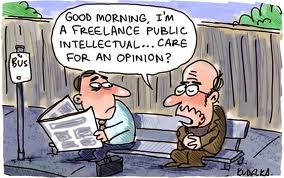 The Fifth Annual Conference on Public Intellectuals has just been announced and will be held, as it has been in the past, at Harvard University. I will put up a news item regarding the essential details of the conference and the call for papers, but I also wanted to introduce the topic to readers of the blog. The description of the conference provided by John Lenz, Chair of the Classics Department at Drew University, reads:
The Fifth Annual Conference on Public Intellectuals has just been announced and will be held, as it has been in the past, at Harvard University. I will put up a news item regarding the essential details of the conference and the call for papers, but I also wanted to introduce the topic to readers of the blog. The description of the conference provided by John Lenz, Chair of the Classics Department at Drew University, reads:
Since the 1950s, writers and thinkers such as Hannah Arendt, Thomas Bender, Noam Chomsky, Kenneth Clark, bell hooks, Irving Howe, Russell Jacoby, Toni Morrison, Richard Posner, Ayn Rand, Bertrand Russell, Edward Said,
Jean-Paul Sartre, Thomas Sowell, and Cornel West have debated the meaning and purpose of public intellectuals. Many have openly criticized what they call the increasing corporatization of academic work within the academy. Increasing specialization and the narrowing of disciplines,
some argue, have led to a growing paucity of radical ideas and true critical alternatives while fostering a growing obsession with a mass-media-infused culture. Others on the ideological right maintain that leftist public intellectuals do not pay enough attention to supposed practical needs or market forces and are too protected by and safely ensconced in tenured ivory towers, talking and writing only to
themselves and training students to do the same. In seemingly contradictory fashion, other conservatives have contended that leftist intellectuals have too much power and influence on government elites with their hopelessly naïve and outmoded ideas.This conference seeks to bring together scholars and researchers in all disciplines whose work focuses on public intellectuals in the 20th and 21st centuries. We hope to engage these issues while moving beyond past debates into new considerations of the role of intellectuals in public life. The conference also seeks to provide a forum for self-reflection by public intellectuals in the past and present.
John concludes that his group “seeks proposals that address the theme, ‘Public Intellectuals and Power: In and Out of Academe” in the 20th and 21st centuries.'” He then adds suggested subtopics, including: “Intellectuals in power or critical of power; Intellectuals in war; Race; Gendering discourse; Intellectuals and the media; Comparative national and global perspectives; Classic works on public intellectuals.”
I imagine those who read this blog might suggest additional subtopics and would have something to say regarding the general discussion of public intellectuals and power. I know I have spent a good deal of time on this blog writing about Reinhold Niebuhr, Robert Bellah, and Richard John Neuhaus, all three having different relationships with different types of power. Niebuhr and Neuhaus have been roundly criticized for moving too close to those with political power, to the point that they seem to have been co-opted in a certain sense by such relationships. As always, I’d be interested to hear what other people are working on that would relate to this general topic.

3 Thoughts on this Post
S-USIH Comment Policy
We ask that those who participate in the discussions generated in the Comments section do so with the same decorum as they would in any other academic setting or context. Since the USIH bloggers write under our real names, we would prefer that our commenters also identify themselves by their real name. As our primary goal is to stimulate and engage in fruitful and productive discussion, ad hominem attacks (personal or professional), unnecessary insults, and/or mean-spiritedness have no place in the USIH Blog’s Comments section. Therefore, we reserve the right to remove any comments that contain any of the above and/or are not intended to further the discussion of the topic of the post. We welcome suggestions for corrections to any of our posts. As the official blog of the Society of US Intellectual History, we hope to foster a diverse community of scholars and readers who engage with one another in discussions of US intellectual history, broadly understood.
Great questions, Ray. I imagine (or hope) that one thing to come out of such a conference would be more nuanced understandings of “power.” The field of Diplomatic History, for instance, seems to equate “power” with “influence on policy.” If that’s the case, then Niebuhr was a terrible unpowerful public intellectual. So, I guess I’m wondering, what do we mean by “power?” Can offering an alternative vision of world order from the Truman Doctrine, for instance, that never changes policy, still be a form or expression of power–I’m thinking of a Paul Robeson, for instance?
sorry, “terribly unpowerful”
This is really fascinating! I find myself working more and more on Black intellectuals in the 1970s and 1980s. I’ve written about that on the blog in the past, but I like to think about those public intellectuals and their relationship to larger political battles between Left and Right in the last forty years. Indeed, what I’m most concerned with is how all these forces construct memory of Civil Rights and Black Power movements–and how the public digested these debates.